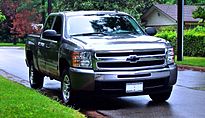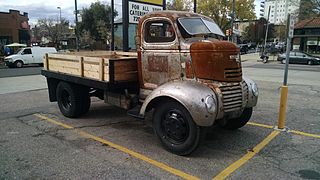
GMC

 |
|
|
Type
|
Division LLC |
|---|---|
| Industry | Automotive |
| Predecessors | Rapid Motor Vehicle Company Reliance Motor Car Company |
| Founded | July 22, 1911 |
| Founder | William C. Durant |
| Headquarters | Detroit, Michigan, U.S. |
|
Area served
|
|
| Products | Automobiles Commercial vehicles Trucks |
| Services |
|
| Parent | General Motors |
| Website | gmc.com |
GMC (General Motors Truck Company), formally the GMC Division of General Motors LLC, is a division of the American automobile manufacturer General Motors (GM) that primarily focuses on trucks and utility vehicles.
GMC sells pickup and commercial trucks, buses, vans, military vehicles, and sport utility vehicles marketed worldwide by General MotorsHistory

General Motors was founded by William C. Durant on September 16, 1908, as a holding company for Buick. In 1909, GM purchased the Rapid Motor Vehicle Company of Pontiac, Michigan, forming the basis of the General Motors Truck Company, from which the "GMC Truck" brand name was derived. (Rapid was established on December 22, 1901, by Max Grabowsky. The company developed some of the earliest commercial trucks ever designed, and utilized one-cylinder engines.) The Reliance Motor Car Company (another independent manufacturer) was also purchased that same year by GM. Rapid and Reliance were merged in 1911, and in 1912 the marque "GMC Truck" first appeared on vehicles exhibited at the New York International Auto Show. Some 22,000 trucks were produced that year, though GMC's contribution to that total was a mere 372 units. GMC had some currency within GM referring to the corporate parent in general. Later "GMC" would become distinct as a division brand within the corporation, branding trucks and coaches; in contrast, the abbreviation for the overall corporation eventually ended up as "GM".
GMC maintained three manufacturing locations in Pontiac, Michigan, Oakland, California, and Saint Louis, Missouri.
In 1916, a GMC Truck crossed the country from Seattle to New York City in thirty days, and in 1926, a 2-ton GMC truck was driven from New York to San Francisco in five days and 30 minutes. During the Second World War, GMC Truck produced 600,000 trucks for use by the United States Armed Forces.
In 1925, GM purchased a controlling interest in Yellow Coach, a bus manufacturer based in Chicago, Illinois which was founded by John D. Hertz. After purchasing the remaining portion in 1943, GM renamed it GM Truck and Coach Division. The Division manufactured interurban coaches until 1980. Transit bus production ended in May 1987. The Canadian plant (in London, Ontario) produced buses from 1962 until July 1987. GM withdrew from the bus and coach market because of increased competition in the late 1970s and 1980s. Rights to the RTS model were sold to Transportation Manufacturing Corporation, while Motor Coach Industries of Canada purchased the Classic design. In 1998, GMC's official branding on vehicles was shortened from "GMC Truck" to simply "GMC".
In 2002, GMC released a book entitled, GMC: The First 100 Years, a complete history of the company.
GMC currently manufactures SUVs, pickup trucks, vans, light-duty trucks, and medium duty trucks. In the past, GMC also produced fire trucks, ambulances, heavy-duty trucks, military vehicles, motorhomes, and transit buses.
Similarity to Chevrolet






Starting in 1920, GMC and Chevrolet trucks are virtually identical except for the grilles and nameplates, though their differences have varied over the years. From 1955 through 1959 small (less than 2 ton) GMC trucks with gasoline V8s were equipped with Pontiac, Buick, and Oldsmobile V8s (the Canadian trucks used Chevrolet engines). GMC had its own line of inline 6 cylinder engines, known as "Jimmy's" from 1939-1959, and their own V6 from 1960-1974 (also a V8, V12). Chevrolet trucks were marketed towards private ownership, while GMC was focused towards commercial uses.
New Chevrolet vehicles are sold exclusively at Chevrolet dealerships, GMC light trucks have recently been made available to Buick and Cadillac dealerships with previous Pontiac and Oldsmobile dealerships also having similar arrangements, and separate franchises exist for medium and light-duty commercial models as well. This crossover allowed GM dealers that did not sell Chevrolets to offer full lineups of both cars and trucks by offering GMC's trucks alongside "non-truck" divisions. Between 1962 and 1972, most GMC vehicles were equipped with quad-headlights, while their Chevrolet clones were equipped with dual-headlights.
In 1971, GMC marketed their version of the Chevrolet El Camino, which was based on the Chevrolet Chevelle. Called Sprint, it was virtually identical to the El Camino, and a sport version, the SP, was equivalent to the El Camino SS. In 1973, with GM’s introduction of the new "rounded line" series trucks, GMC and Chevrolet trucks became even more similar, ending production of GMC’s quad-headlight models, and setting the standard for the Chevrolet/GMC line of trucks for over thirty years. During this period, the companies' sister models (Silverado/Sierra, Blazer/Jimmy, Tahoe/Yukon, etc.) shared everything except for trims and prices. GM has recently begun a divergence in design between the two lines with the 2007 model Silverados and Sierras, which have some differences in sheet metal and style.[citation needed]
In 1996, GM merged GMC with the Pontiac division in order to give Pontiac dealerships a line of trucks mainly to allow Pontiac dealers to compete with Chevrolet, which offered a full lineup of vehicles. While many GMC and Chevrolet trucks are mechanically identical, GMC is positioned as a premium offering to the mainstream Chevrolet brand, with luxury vehicles such as the Denali series. The profitability of the GMC brand helped its survival in 2009 during the General Motors Chapter 11 reorganization, and after the discontinuation of the Pontiac brand, many Buick franchises also sell GMC light-duty vehicles in the United States and Canada.
In 2007, GMC introduced the Acadia, a crossover SUV, which was the division's first unibody vehicle whose predecessor, the GMT-360 based Envoy, was discontinued with the closure of GM's Moraine, Ohio plant on December 23, 2008.
In 2009, GMC introduced the Terrain, a mid-size crossover SUV based on GM's Theta platform which slots below the Acadia as GMC's smallest crossover, replacing the Pontiac Torrent and sharing no sheetmetal with the Chevrolet Equinox.
GMC models
Light-duty trucks
| Model | Introduced | Discontinued | Notes |
|---|---|---|---|
| C and E series | 1941 | 1947 | Little difference with the Chevrolet Art Deco trucks |
| New Design series | 1947 | 1955 | Little difference with the Chevrolet Advance-Design trucks |
| Blue Chip series | 1955 | 1959 | Pontiac Powered, similar to the Chevrolet Task-Force trucks |
| C and K Series | 1960 | 1998 | half–, three-quarter– and one-ton trucks, with Sierra, Sierra Grande, High Sierra, and Sierra Classic trim lines |
| Sprint | 1971 | 1977 | Coupe utility - GMC version of the 1971 to 1977 Chevrolet El Camino |
| Caballero | 1978 | 1987 | Coupe utility - GMC version of the 1978 to 1987 Chevrolet El Camino |
| S-15 | 1982 | 1990 | Became the Sonoma in 1991 |
| Sonoma | 1991 | 2004 | Formerly the S-15 1982-1990 |
| Syclone | 1991 | 1991 | High performance version of the Sonoma |
| Sierra | 1996 | current | GMC version of Chevrolet Silverado medium- and heavy-duty pickup |
| Canyon | 2004 | current | GMC version of Chevrolet Colorado midsize pickup |
Medium-duty trucks
| Model | Introduced | Discontinued | Notes |
|---|---|---|---|
| Varies, first letter denotes production year: A=1939-1940, C=1941-1945, E=1946, F=1947-1950, Z=1954, Y=1955, X=1956, T=1957, S=1958-1959, N=1960; Second letter denotes cab style: C=cab behind engine, F=cab over engine |
1939 | 1959 | Line sold to Navistar, now marketed under the WorkHorse brand. |
| L-Series | 1960 | c.1984 | Steel Tilt Cab |
| TopKick | 1980 | 1996 | |
| C-Series | 1960 | 2009 | |
| Forward | 1980s | 2010 | |
| W-Series | late 1980s | 2010 | Rebranded Isuzu Elf |
| T-Series | 1994 | 2010 | |
| TopKick | 2003 | 2009 | Model used for Ironhide in the Transformers film series |
Heavy-duty trucks

| Model | Introduced | Discontinued | Notes |
|---|---|---|---|
| DLR/F/“Crackerbox” | 1959 | 1968 | Aluminium Tilt Cab |
| B-Model | 1960 | 1966 | |
| 7500 | 1963 | 1978 | |
| 9500 | 1966 | 1978 | |
| Astro 95 | 1968 | 1988 | |
| General | 1977 | 1988 | |
| Brigadier | 1978 | 1988 |
Buses
| Model | Introduced | Discontinued | Notes |
|---|---|---|---|
| P-series | 1940s | 1980 | “Parlor” (highway) coaches |
| “Old Look” | 1940 | 1969 | transit |
| “New Look” | 1959 | 1986 | transit |
| RTS | 1977 | 1987 | transit |
| Classic | 1982 | 1987 | transit |
| B-series | 1966 | 2003 | school bus |
| S-series | 1986 | 1989 | school bus (forward control) |
Vans
| Model | Introduced | Discontinued | Notes |
|---|---|---|---|
| Handi-Van | 1964 | 1970 | |
| Handi-Bus | 1964 | 1970 | |
| Rally | 1970 | 1996 | GMC version of the Chevrolet Sportvan |
| Vandura | 1970 | 1996 | GMC version of the Chevrolet Chevy Van |
| Safari | 1985 | 2005 | GMC version of the Chevrolet Astro |
| Savana | 1996 | current | GMC version of the Chevrolet Express |
SUVs
| Model | Introduced | Discontinued | Notes |
|---|---|---|---|
| Suburban | 1937 | 2000 | Rebranded as Yukon XL |
| Jimmy | 1969 | 2005 | GMC version of the Chevrolet Blazer |
| S-15 Jimmy | 1983 | 2005 | |
| Tracker | 1989 | 1991 | Canada only |
| Typhoon | 1992 | 1993 | High performance version of the S-15 Jimmy |
| Yukon | 1992 | current | GMC version of the Chevrolet Tahoe |
| Envoy | 1998 | 2009 | GMC version of the Chevrolet TrailBlazer |
| Yukon Hybrid | 2009 | 2013 | GMC version of Chevrolet Tahoe Hybrid and Cadillac Escalade Hybrid |
| Yukon XL | 2001 | current | Formerly the Suburban |
| Acadia | 2007 | current | GMC version of the Chevrolet Traverse; became a mid-size crossover SUV commencing with the 2017 model year |
| Terrain | 2010 | current | GMC version of the Chevrolet Equinox |
Motorhomes
| Model | Introduced | Discontinued | Notes |
|---|---|---|---|
| GMC motorhome | 1973 | 1978 |
Military vehicles
| Model | Introduced | Discontinued | Notes |
|---|---|---|---|
| CCKW/CCW | 1941 | 1945 | |
| AFKWX | 1941 | 1945 | Cab over engine |
| DUKW | 1942 | 1945 | Amphibious |
Gallery
-

1947 GMC cabover truck
-
A 1966 GMC K1500 converted for railroad service in Pennsylvania.
-

New York City Omnibus 2969 is an “Old Look” TDH-5101 built in 1949.
-

A 1968-vintage Suburban-type New Look bus.
-
A 1948 PD-3751 bus built for Greyhound Lines.
-

CCKW 353
-

AFKWX-353 C.O.E.
-

DUKW Amphibian























